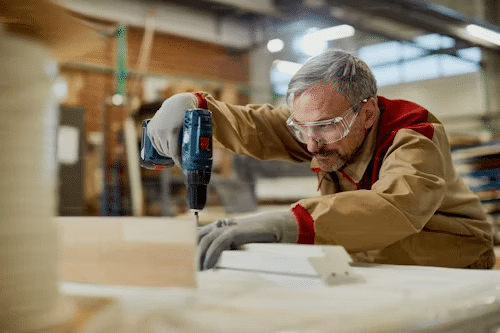If you’re looking for a reliable and efficient way to secure materials to concrete, then hex head concrete screws might be the solution you’ve been searching for. These screws are designed to provide a strong and secure connection between concrete and other materials, such as wood or metal. With their unique thread design and ceramic coating, hex head concrete screws offer maximum pull-out resistance and corrosion resistance, making them an ideal choice for a wide range of applications.
Fastening Specialists is your go-to source for all your fastening needs. As a trusted wholesale distributor for over 65 years, we are specialists in this field and can provide you with the best in product value, insight, code expertise, and order fulfillment. With a wide range of hex head concrete screws available in various sizes, materials, and coatings, we have the expertise to help you find the right fastening solution for your specific application. Whether you’re in construction, HVAC, or any other industry that requires secure and reliable fastening, you can trust us to provide you with the best products and service in the industry.
Understanding Hex Head Concrete Screws
Hex head concrete screws are a popular type of fastener used to attach materials to concrete surfaces. They are designed to be easy to install and provide a strong, reliable hold. In this section, we will explore the composition and design of hex head concrete screws, as well as their size and tolerance.
Composition and Design
Hex head concrete screws are typically made from carbon steel, which provides strength and durability. They are also available in stainless steel, which is resistant to corrosion and rust. The hexagonal head of the screw provides a sturdy point of contact for tools, making it easier to apply force during installation.
In addition to the hex head, hex head concrete screws also feature a washer. The washer helps to distribute the load over a larger area, reducing the risk of the screw pulling out of the concrete. The washer can be made from a variety of materials, including steel and nylon.
Size and Tolerance
Hex head concrete screws are available in a range of sizes, typically ranging from 1/4 inch to 3/4 inch in diameter. The size of the screw you choose will depend on the application and the weight of the materials you are attaching to the concrete surface.
It is important to note that hex head concrete screws have a tolerance, which means that the actual size of the screw may vary slightly from the stated size. This tolerance is typically +/- 0.005 inches for screws up to 1/2 inch in diameter, and +/- 0.010 inches for screws larger than 1/2 inch in diameter.
Pre-Installation Considerations
Before installing hex head concrete screws, there are several pre-installation considerations to keep in mind. In this section, we will cover two important considerations: Base Material Analysis and Selecting the Correct Drill Bit.
Base Material Analysis
It is important to analyze the base material before installing hex head concrete screws. The base material can be masonry, brick, block, or concrete. The concrete compressive strength and type of aggregate can affect the installation process. It is important to ensure that the base material is strong enough to hold the screw securely in place. If the base material is weak, the screw may not hold and could fail over time.
Selecting the Correct Drill Bit
Selecting the correct drill bit is crucial for the installation of hex head concrete screws. A standard ANSI drill bit or a carbide drill bit can be used depending on the base material. The size of the drill bit should match the size of the screw being used. It is important to ensure that the drill bit is sharp and in good condition to prevent damage to the base material.
Installation Process
Installing hex head concrete screws is a quick and easy process that requires only a few steps. In this section, we will cover the two main steps of the installation process: drilling and cleaning, and screw anchoring and depth.
Drilling and Cleaning
The first step in installing a hex head concrete screw is to drill a hole into the concrete using a drill bit that matches the size of the screw. It is important to use a drill bit that is specifically designed for use with concrete, as other types of bits may not be able to penetrate the surface effectively.
Once the hole has been drilled, it is important to clean out any debris or dust that may have accumulated inside. This can be done using compressed air or a small brush. Cleaning out the hole will ensure that the screw can be anchored securely into the concrete.
Screw Anchoring and Depth
The next step in the installation process is to anchor the screw securely into the concrete. To do this, simply insert the screw into the hole and begin turning it clockwise using an installation tool. It is important to ensure that the screw is inserted straight and that it is not over-tightened, as this can cause the concrete to crack or break.
The embedment depth of the screw is also a crucial factor in ensuring a secure installation. The embedment depth refers to the depth at which the screw is anchored into the concrete. It is important to ensure that the screw is anchored at the correct depth, as this will ensure that it is able to withstand the weight and pressure of the object that is being attached to it.
Post-Installation Guidelines
After installing hex head concrete screws, there are some important guidelines that you should follow to ensure the safety and longevity of your installation. In this section, we will cover load assessment and safety, as well as maintenance and corrosion management.
Load Assessment and Safety
It is important to assess the load capacity of your installation to ensure that it can safely support the intended load. Overtightening the screws can lead to reduced load capacity and bending moments, which can compromise the safety of the installation. Therefore, it is important to follow the manufacturer’s recommended torque values and avoid overtightening the screws.
Mechanical interlock is an important factor in the load capacity of hex head concrete screws. The screws rely on the mechanical interlock between the threads of the screw and the base material to provide the necessary strength. Sustained loads should also be considered when assessing the load capacity of the installation.
Maintenance and Corrosion Management
Hex head concrete screws are often zinc-plated to provide protection against corrosion. However, it is important to regularly inspect the installation for signs of corrosion and take appropriate measures to prevent further corrosion.
Product Selection and Purchase
One important factor to consider is the size of the screw. Fastening Specialists offers a variety of sizes to ensure that you find the right fit for your project. Additionally, we carry a range of coatings, including blue Perma-Seal finish and zinc-plated, to provide long-lasting corrosion protection.
Another important factor to consider is the installation tool kit. The Simpson Strong-Tie Titen Installation Tool Kit is a great option for those looking for a comprehensive kit that includes everything needed for installation.
When it comes to purchasing hex head concrete screws, We offer competitive pricing and inventory levels to ensure that you get the products you need at the right price. While we do not have physical store locations, we offer fast and reliable shipping to get your products to you quickly.
Overall, when it comes to selecting and purchasing hex head concrete screws, We are the clear choice. With our extensive product selection, competitive pricing, and unmatched expertise, you can trust us for all of your fastening needs.
The team at fastening specialists provides advice and best use-cases, but always check with local building codes and engineers for correct usage instructions.

